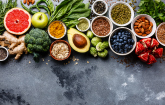ROCKVILLE, Md., May 15, 2018 /PRNewswire/ -- The belief that natural, organic, and humane agricultural practices produce foods that are healthier, tastier, or more nutritious is widespread among the general adult population. These convictions, especially among consumers who seek out clean label products, combined with rising concerns over food safety have caused a notable shift in behavior when purchasing foods and beverages. Market research firm Packaged Facts in the report Organic and Clean Label Food Consumer in the U.S. revealed that more than half (53%) of adults say they are buying more natural and organic foods than ever before, and nearly half are buying more organic foods through standard supermarkets as organic selections have expanded.
"Many consumers ascribe positive attributes to clean label foods, even if they don't personally partake," says David Sprinkle, research director for Packaged Facts. "The food industry has seen a rise in adults who believe that various food products that are natural, boast organic or animal-welfare credentials, or make other claims to clean label status taste better, are healthier, are more nutritious, or are better for the environment."
In painting a picture of the archetypal clean label consumer, Packaged Facts' research found that the organic/clean label consumer tends to be informed, curious, and engaged, as well as active in the management of his or her own health and wellness, and often highly educated and accomplished professionally. However, it is also true that there is a powerful emotional component to clean label consumerism. It's personal. It means connecting to the community and to the world; making choices that are possibly values driven, or perhaps inspired by nostalgia for a simpler time; and advocating for the well-being of animals raised for food, of growers in developing countries, or of the planet. It can be empowering to those with this mentality, notes Sprinkle.
Further, Packaged Facts found that the demographic features disproportionately seen in organic and clean label consumers also include:
- being Millennials and younger Generation Xers
- being of Hispanic and Asian ethnicities
- residence in the Northeast and Pacific regions of the U.S.
- possession of an advanced academic degree (beyond college)
- presence of children in the household, particularly younger children
- an annual household income of $100,000 or more
About the Report
Organic and Clean Label Food Consumer in the U.S. examines the dynamics of the current organic and clean label landscape, including shifts in consumer usage rates, cross-usage, psychographics, and demographics. The reasons for and implications of these shifts are analyzed in the context of future market opportunities for product manufacturers as well as for retail channels (natural/specialty vs. mass/value), including private-label and Internet opportunities.
View additional information about Organic and Clean Label Food Consumer in the U.S., including purchase options, the abstract, table of contents, and related reports at Packaged Facts' website: https://www.packagedfacts.com/food-beverage-market-c84/.
About Packaged Facts
Packaged Facts, a division of MarketResearch.com, publishes market intelligence on a wide range of consumer market topics, including consumer demographics and shopper insights, consumer financial products and services, consumer goods and retailing, consumer packaged goods, and pet products and services. Packaged Facts also offers a full range of custom research services.
For more essential insights from Packaged Facts be sure to follow us on Twitter and Google+. For infographics, tables, charts and other visuals, follow Packaged Facts on Pinterest.
Please link any media references to our reports or data to https://www.packagedfacts.com/.
Press Contact:
Daniel Granderson
240.747.3000
[email protected]
SOURCE Packaged Facts
Related Links
https://www.packagedfacts.com/
WANT YOUR COMPANY'S NEWS FEATURED ON PRNEWSWIRE.COM?
Newsrooms &
Influencers
Digital Media
Outlets
Journalists
Opted In





Share this article